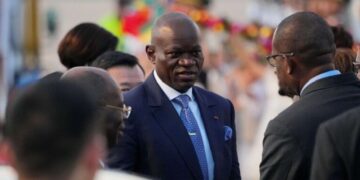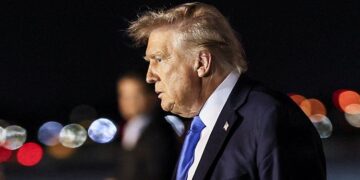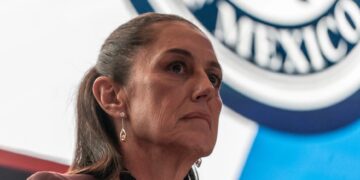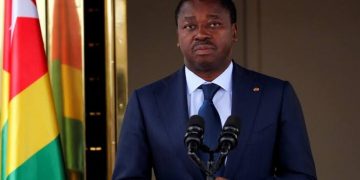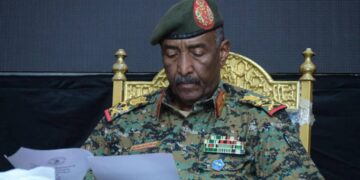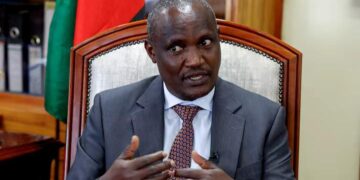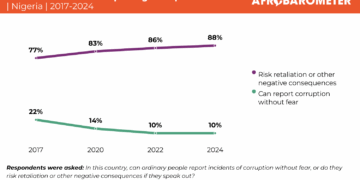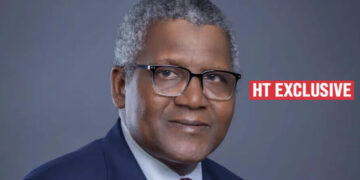By Ere-Ebi Agedah Imisi
Healthcare crisis in Kenya deepened on Tuesday as the Kenyatta University Referral Hospital, located in the capital city of Nairobi, announced the dismissal of 100 doctors actively participating in a nationwide strike that has persisted for almost a month.
This drastic measure comes amid mounting tensions between healthcare workers and the government over long-standing grievances regarding pay and working conditions. In the heat of the moment the management of the hospital defended their action by stating that new doctors have been recruited to fill the positions left vacant by those on strike.
The strike, initiated by doctors across Kenya in mid-March, has been driven by demands for improved pay and better working conditions. The plight of healthcare workers in Kenya has long been a point of contention, with recurring strikes being a testament to the persistent challenges faced by medical professionals in the country.
READ ALSO: Iran Launches Hundreds Of Direct Drone Strikes At Israel
Meanwhile, President William Ruto’s recent remarks on the strike have added another layer of complexity to the situation. Ruto, addressing the issue, cited financial constraints as a barrier to meeting the demands of the striking doctors.
On Sunday, President William Ruto broke his silence over the strike saying there was no money to pay striking doctors.
“We must be honest with ourselves and the truth is that we must live within our means, we can’t borrow money to pay salaries”, Ruto said.
Matters Arising
This move has sparked widespread debate and concern and the President’s comments has been met with widespread criticism from healthcare workers and the masses, who argue that adequate funding for healthcare should be a top priority.
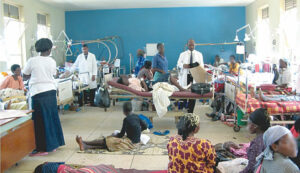
Despite the government’s stance, the doctors’ union remains steadfast in its demands as hundreds of doctors took to the streets in protest, urging parliament to intervene in their labor dispute. This latest demonstration underscores the urgency of addressing the grievances of healthcare workers and highlights the growing frustration within the medical community.
The striking doctors in Kenya has again highlighted the importance of funding healthcare sector in Africa, as it directly impacts the well-being, prosperity, and development of the continent.
According to award winning Dr. Mitch Besser, an obstetrician and gynecologist, “Sub-Saharan Africa has 24 percent of the global disease burden, yet only three percent of the world’s health care workers.”
Suffice to note that investing in healthcare contributes to economic development by promoting a healthier workforce since healthy individuals are more productive, leading to increased labor force participation, higher incomes, and economic growth. Additionally, a robust healthcare system attracts foreign investment, fosters innovation, and supports the growth of industries related to healthcare, such as pharmaceuticals, medical technology, and biotechnology.
Heritage Times (HT) recalls that the current strike is not an isolated incident but rather a continuation of a recurring pattern. In 2017, Kenyan doctors embarked on a 100-day strike, which resulted in significant disruptions to healthcare services and tragic loss of lives due to lack of medical attention. While an agreement was eventually reached between the doctors’ union and the government, it appears that some of the promises made during that negotiation are yet to be fulfilled.
Amidst the ongoing strike and the broader healthcare crisis in Kenya, reports have emerged of doctors being abducted from medical facilities by bandits. These abductions, allegedly carried out by armed groups seeking medical assistance for their injured members, highlight the precarious working conditions faced by healthcare professionals in the continent. Such incidents not only jeopardize the safety of doctors but also underscore the urgent need for improved security measures in medical facilities.
Furthermore, the issue of healthcare worker migration adds another layer of complexity to the situation. Across the African continent, doctors are leaving their home countries in search of better opportunities in Europe and America revealing an already dire shortage of medical professionals in Kenya.
Legal Implications
Speaking to Heritage Times (HT) Fatia Abiodun, a public lawyer and attorney based in Abuja, Nigeria, emphasized on the legal framework surrounding essential services and strikes in Africa. Abiodun noted that no African country can claim to have a surplus of medical personnel, highlighting the critical shortage across the continent.
‘‘Under the Essential Service Act, certain professions are designated essential and are prohibited from going on strike. These include the police and security agencies, as their absence could lead to irreparable damage. Medical personnel, due to their responsibility for preserving life, are also classified as essential workers and are typically not allowed to strike. However, before engaging in strike action, they must provide prior notice, often in the form of a warning strike’’
Abiodun sighted a previous debate regarding whether education, particularly university professors represented by ASUU (Academic Staff Union of Universities), should be considered an essential service. However, the court ruled against this classification, citing the existence of holidays in the education sector, unlike in the medical field where personnel only take leave.
Regarding the dismissal of striking doctors in Kenya, Abiodun referenced a similar situation in Nigeria during the President Buhari administration.
Abiodun argued that such actions are legally permissible under certain circumstances, especially when the government deems it necessary for the public interest.
‘‘In Nigeria, the government declared that doctors who did not return to work would face consequences, including potential replacement by other medical graduates. The government should look towards their plight and their demands. The laborers have the right to demand for a better working environment’’
However, Abiodun cautioned against the potential negative impact of dismissing 100 doctors in Kenya, stressing the already dire shortage of medical personnel across Africa. He urged for a balanced approach, emphasizing the importance of addressing the grievances of healthcare workers and ensuring a conducive working environment.
‘’This is a case of when two elephants are fighting the grass will suffer, in the interest of the general public, 100 is too much, it should surely have a negative impact on the medical personnel and the medical facilities of the country, there is no two ways’’
Also, Abiodun underscored the widespread issue of medical brain drain, where African countries experience a significant exodus of healthcare professionals seeking better opportunities abroad, known as the “JAPA syndrome,” as he maintained that this has further worsened the shortage of medical personnel in African countries.
He therefore called for a holistic approach that addresses both the immediate concerns of healthcare workers and the systemic issues contributing to the healthcare crisis on the continent.
Which Way Africa
The dismissal of 100 striking doctors by the Kenyatta University Referral Hospital raises serious questions about Kenya’s approach to addressing the healthcare crisis gripping the country. While financial constraints may pose significant challenges, dismissing doctors is unlikely to resolve the underlying issues driving the strike. Instead, it is imperative that the government and stakeholders engage in meaningful dialogue to address the legitimate grievances of healthcare workers and work towards sustainable solutions that ensure access to quality healthcare for all citizens.








